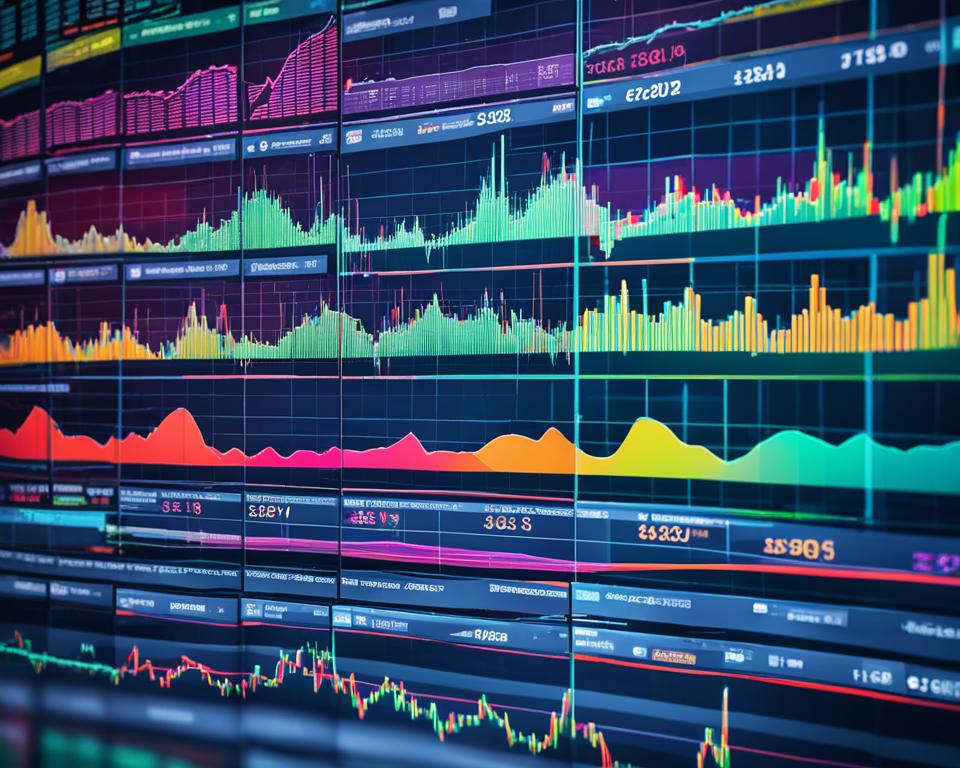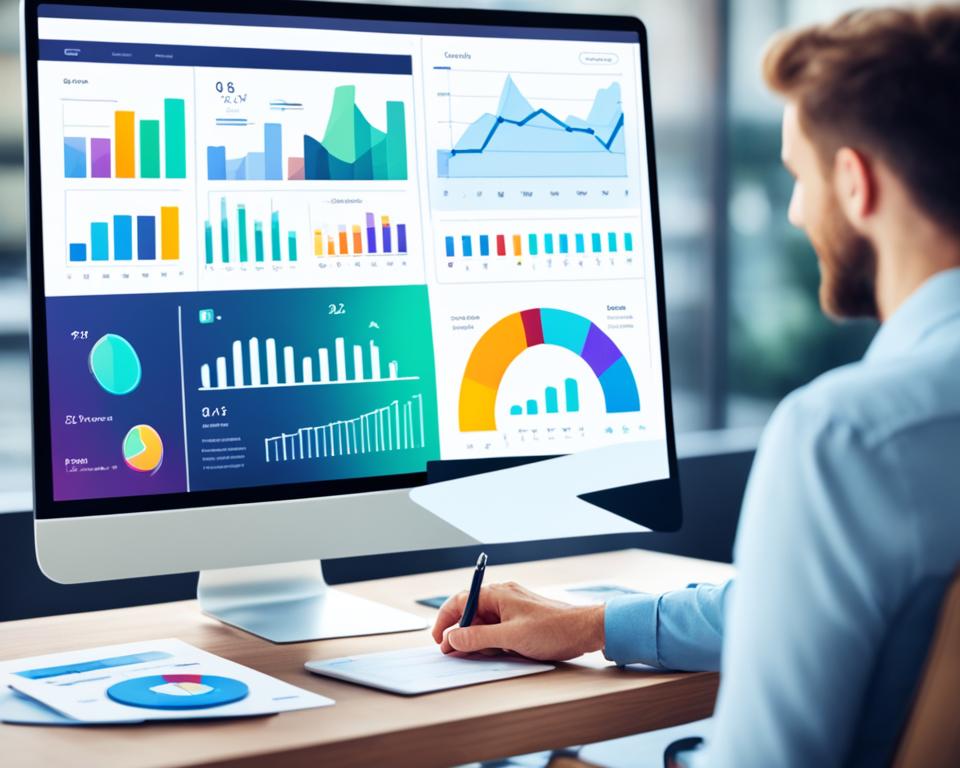Trading Platforms – Find the Best Online Brokers in 2023

This comprehensive guide will help you navigate the world of trading platforms and find the best online brokers to meet your investment needs in 2023. Whether you’re looking to trade stocks, forex, cryptocurrencies, or explore advanced features like algorithmic trading, you’ll discover the top platforms that offer the tools, resources, and user experience to support your trading goals.
Key Takeaways
- Discover the best online brokers for your trading needs in 2023.
- Learn how to navigate the diverse landscape of trading platforms and identify the one that suits your requirements.
- Explore top platforms for stocks and equities, forex and CFDs, and cryptocurrencies.
- Understand the key factors to consider when choosing a trading platform, including pricing, security, and compatibility.
- Gain insights to make informed decisions and maximize your investment potential.
Navigating the World of Trading Platforms
Navigating the diverse landscape of trading platforms and identifying the one that best suits your specific needs is a critical first step in your investment journey. Whether you’re focused on stocks, forex, cryptocurrencies, or a combination of asset classes, understanding your trading requirements is essential.
Understanding Your Trading Needs
Begin by evaluating your investment goals, risk tolerance, and the asset classes you’re interested in exploring. Are you primarily interested in stock trading apps for equities, or do you prefer forex trading software and CFD (Contracts for Difference) trading solutions? Perhaps you’re drawn to the world of cryptocurrency exchanges and the opportunities they present. Clearly defining your trading needs will help you narrow down the investment platforms that can best support your investment strategy.
Evaluating Platform Features
Once you’ve identified your trading needs, it’s time to explore the features offered by various trading platforms. Consider the breadth of asset classes they support, the range of trading tools and analytical resources available, and the presence of advanced features like algo trading systems and automated trading solutions. Assessing the platform’s ability to cater to your specific investment requirements will ensure you choose a solution that aligns with your long-term goals.
Considering User Experience
The user experience of a trading platform is equally important. Evaluate the platform’s intuitiveness, ease of navigation, and the overall user-friendliness of its portfolio management tools and trading analytics. A seamless and responsive interface can significantly enhance your trading efficiency and overall satisfaction with the platform.

Exploring Top trading platforms for Different Markets
In the dynamic world of investing, traders have a plethora of options when it comes to choosing the right trading platforms to meet their specific needs. Whether you’re interested in stocks and equities, forex and CFDs, or the cryptocurrency market, there are tailor-made solutions to cater to your trading preferences.
Stocks and Equities Trading Platforms
For those seeking to venture into the world of stocks and equities, platforms like Charles Schwab, Fidelity, and TD Ameritrade offer comprehensive suites of tools, research, and educational resources to empower your trading journey. These leading online brokers provide access to a vast array of financial instruments, including domestic and international stocks, ETFs, mutual funds, and options, all with competitive pricing and user-friendly interfaces.
Forex and CFD Trading Solutions
For traders seeking to explore the dynamic world of foreign exchange and contract-for-difference (CFD) markets, platforms like OANDA, FOREX.com, and City Index offer a wealth of features and tools. These forex trading software solutions provide access to a wide range of currency pairs, commodities, and indices, along with advanced charting capabilities, automated trading systems, and comprehensive market analysis.
Cryptocurrency Exchanges
As the cryptocurrency market continues to gain momentum, a growing number of cryptocurrency exchanges have emerged to cater to the needs of digital asset enthusiasts. Platforms like Kraken, Gemini, and Binance offer seamless access to a diverse range of cryptocurrencies, along with innovative features such as staking, lending, and advanced trading tools for algo trading systems and automated trading solutions.

| Trading Platform | Asset Classes | Key Features | Pricing |
|---|---|---|---|
| Charles Schwab | Stocks, ETFs, Mutual Funds | Robust research tools, Automated portfolio management, Mobile trading app | $0 online equity and ETF trades, $0 account minimum |
| Fidelity | Stocks, Bonds, Mutual Funds, ETFs | Extensive market research, Advanced trading tools, Personalized wealth management | $0 online equity and ETF trades, $0 account minimum |
| TD Ameritrade | Stocks, Options, Futures, Forex, Cryptocurrencies | Thinkorswim trading platform, Extensive education resources, Automated trading strategies | $0 online equity and ETF trades, $0 account minimum |
| OANDA | Forex, CFDs, Precious Metals | Cutting-edge charting tools, Automated trading algorithms, Social trading features | Competitive spreads, No account minimum |
| Coinbase | Cryptocurrencies | Secure digital wallet, Staking and lending options, Advanced trading interface | 0.50% – 3.99% trading fees, $0 account minimum |
Factors to Consider When Choosing a Trading Platform
As you navigate the expansive world of trading platforms, it’s essential to carefully evaluate the factors that will impact your investment journey. From the pricing and fee structure to regulatory compliance and security, the choices you make can significantly influence your trading experience and long-term success.
Pricing and Fee Structure
One of the primary considerations when selecting a trading platform is the pricing and fee structure. Carefully review the commissions, spreads, and any additional charges associated with the platform, as these can have a direct impact on your overall trading costs and profitability. Look for platforms that offer transparent and competitive pricing, allowing you to maximize your returns.
Regulatory Compliance and Security
In the world of finance, regulatory compliance and robust security measures are paramount. Ensure that the trading platform you choose is licensed and regulated by the appropriate authorities, such as the Securities and Exchange Commission (SEC) or the Commodity Futures Trading Commission (CFTC) in the United States. Additionally, examine the platform’s security features, including data encryption, two-factor authentication, and fraud prevention protocols, to safeguard your assets and personal information.
Mobile and Desktop Compatibility
As the trading landscape evolves, the ability to access your accounts and execute trades on the go has become increasingly important. Look for trading platforms that offer seamless mobile applications, allowing you to monitor market trends, analyze data, and make informed decisions from anywhere. Furthermore, ensure that the desktop version of the platform provides a user-friendly and intuitive interface, empowering you to manage your portfolio with ease.




